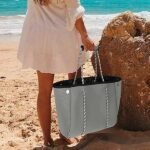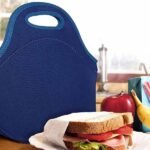Neoprene, also known as polychloroprene, is a synthetic rubber material that has become incredibly popular across multiple industries due to its unique properties. From providing insulation in wetsuits to acting as a durable material for protective gear, neoprene has a diverse range of uses. Whether you’re in manufacturing, fashion, medical supplies, or sports equipment, neoprene offers a combination of flexibility, durability, and resistance that makes it an excellent choice for custom products. In this article, we’ll explore what neoprene is, its main properties, common uses, and why it’s so popular in custom manufacturing.
What Is Neoprene Made Of?
Neoprene is created by polymerizing chloroprene, a monomer that undergoes a chemical process to form a rubbery material. The manufacturing process involves adding various chemicals like accelerators, stabilizers, and curing agents, which modify the final material’s properties. These properties make neoprene incredibly versatile in various applications, from protective wear to insulating materials.
Key Ingredients:
- Chloroprene: The primary building block of neoprene, which forms the rubber compound when polymerized.
- Additives: Various chemicals such as accelerators, stabilizers, and curing agents are added during production to enhance specific properties like flexibility, heat resistance, and durability.
Is Neoprene a Good Material?
Neoprene is widely recognized for its durability and adaptability. It’s a highly versatile material, but is it the right choice for your product? Here are some of its key advantages:
- Durability: Neoprene resists wear and tear, making it long-lasting, even under harsh conditions.
- Water Resistance: Its ability to resist water and moisture makes it perfect for use in wetsuits, diving gear, and water-related applications.
- Flexibility: Neoprene is highly flexible, allowing it to stretch without losing its structural integrity. This makes it great for protective gear that needs to conform to the body.
- Thermal Insulation: Neoprene maintains temperature effectively, making it ideal for insulating products like wetsuits and laptop sleeves.
However, neoprene can be more expensive than other synthetic rubbers, and it is a petroleum-based material, which raises concerns about its environmental impact.
What Is Neoprene Used For?
Neoprene’s versatility allows it to be used in various industries for different types of products. Some of the most common applications include:
- Wetsuits & Water Sports Gear: Neoprene’s excellent water resistance and insulating properties make it ideal for products used in water sports, including wetsuits, diving suits, and water shoes.
- Protective Gear: From knee pads to elbow guards, neoprene is used in sports gear and industrial protective wear because of its shock-absorbing qualities and flexibility.
- Medical Products: Neoprene is used in braces, compression wraps, and other support products due to its comfort and stretchability.
- Fashion and Accessories: Neoprene is gaining popularity in fashion for items like handbags, shoes, and jackets, thanks to its unique texture and flexibility.
- Industrial Uses: Neoprene is used in seals, gaskets, and other components that require durability and resistance to environmental stress.
What Are the Main Properties of Neoprene?
The properties of neoprene make it a highly functional and durable material for a variety of applications. Some of its key properties include:
- Water and Oil Resistance: Neoprene resists water, oil, and chemicals, making it particularly suitable for industrial and outdoor uses.
- Thermal Insulation: Neoprene is an excellent insulator, which is why it’s used in products like wetsuits and insulated bags to maintain temperature.
- Flexibility and Stretch: It remains flexible and can stretch under pressure, making it ideal for products like compression sleeves and protective gear.
- Durability: Neoprene resists abrasion, weathering, and exposure to various environmental elements, ensuring long-lasting products.
How is Neoprene Used in Manufacturing?
Neoprene is used in various manufacturing processes to create products tailored to specific needs. Its adaptability makes it easy to shape into different forms, whether through cutting, molding, or laminating.
Key Manufacturing Processes:
- Cutting: Neoprene can be cut into various shapes and sizes, making it suitable for items like laptop sleeves, pads, and gaskets.
- Molding: Neoprene can be molded into complex shapes, ideal for customized products.
- Laminating: Neoprene can be laminated with other materials, such as fabric or plastic, to enhance its properties or appearance.
Why is Neoprene Popular in Custom Manufacturing?
Neoprene’s popularity in custom manufacturing is due to its ability to be easily customized to meet the specific needs of different industries. Here’s why neoprene is so favored in custom production:
- Custom Shapes and Sizes: Neoprene can be easily molded or cut into custom shapes and sizes, making it highly adaptable to specific product requirements.
- Versatile Thicknesses: Neoprene comes in various thicknesses, allowing manufacturers to select the perfect grade for their application.
- Branding and Aesthetics: Neoprene can be easily printed on, embossed, or decorated, which makes it a great choice for branded products like custom bags, accessories, and clothing.
- Cost-Effectiveness for Customization: Compared to other high-performance materials, neoprene offers a balance of cost and performance, making it a reliable and budget-friendly option for custom products.
Which Industries Benefit from Neoprene Products?
Neoprene is used in a wide range of industries due to its unique combination of properties. Some of the key industries benefiting from neoprene products include:
- Sports & Recreation: Neoprene is essential in the sports industry for products like wetsuits, knee pads, and ankle braces.
- Medical: The medical industry uses neoprene in orthotic devices, braces, and wraps because it offers both comfort and support.
- Fashion: Designers are increasingly turning to neoprene for its durability and flexibility, especially in bags, shoes, and jackets.
- Automotive & Aerospace: Neoprene is used for seals, gaskets, and other industrial components that need to resist extreme temperatures and harsh environments.
- Electronics: Neoprene is used for laptop sleeves, tablet covers, and other protective cases, offering both shock resistance and insulation.
How to Choose the Right Neoprene Manufacturer?
When selecting a neoprene manufacturer, it’s crucial to consider the following factors:
- Quality of Material: Ensure the manufacturer uses high-quality neoprene that meets your specific requirements for durability, flexibility, and resistance.
- Customization Options: The manufacturer should offer customization options like thickness, color, and branding to suit your product needs.
- Production Capabilities: Make sure the manufacturer has the capacity to handle your order volume and can deliver on time.
- Experience and Reputation: Work with a manufacturer that has a proven track record in producing high-quality neoprene products for your industry.
- Customer Service: Choose a manufacturer that offers excellent customer support and is responsive to any questions or issues you may have.
What Are the Benefits of Using Neoprene for Your Products?
Neoprene offers a range of benefits for manufacturers and brands looking to create custom products:
- Durability: Neoprene’s long-lasting qualities make it a smart investment for products that need to endure wear and tear over time.
- Customization: Neoprene can be easily molded, cut, and decorated, offering a wide range of possibilities for product design and branding.
- Protection: Neoprene’s shock-absorbing and insulating properties ensure that your products are well-protected, whether they are exposed to extreme weather or physical impacts.
- Comfort: The material’s flexibility and softness provide a comfortable fit, which is particularly important for products like medical braces, sports gear, and fashion accessories.
- Water Resistance: Neoprene’s resistance to water, oil, and other liquids makes it perfect for items used in wet or harsh environments.
Conclusion
Neoprene is a highly adaptable and reliable material with a vast array of applications across multiple industries. Whether you need custom manufacturing for fashion, medical supplies, sports gear, or industrial components, neoprene’s flexibility, durability, and versatility make it a top choice. By understanding the properties and benefits of neoprene, you can make an informed decision about how it can be used for your products.











